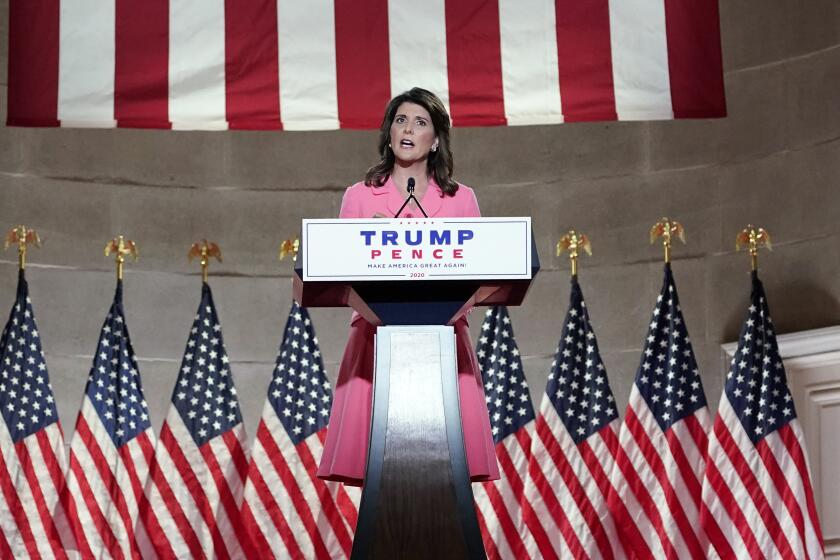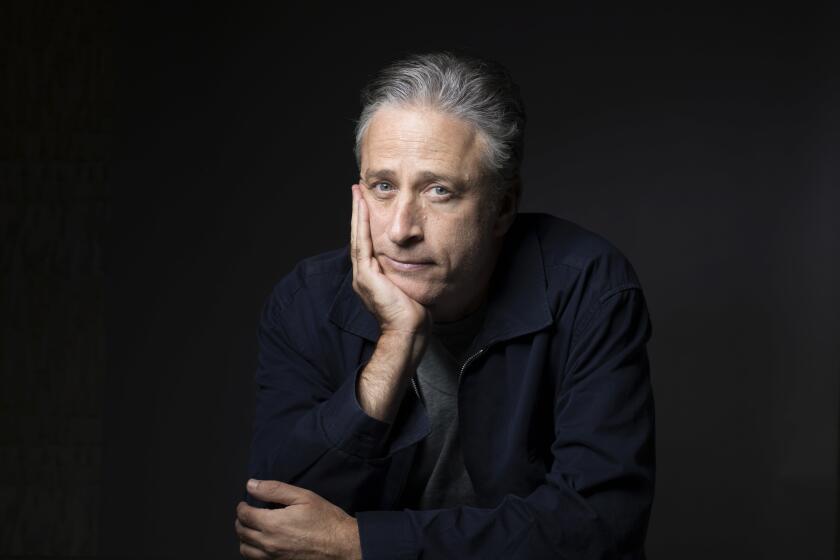At Republican convention, rising stars show unity around Trump but division over party’s future
- Share via
WASHINGTON — Amid vast uncertainty about the Republican Party’s future, several of its rising stars spoke at the convention this week with a dual purpose: falling in line behind President Trump while finding a lane for themselves.
The up-and-comers, many eyeing a run for president in 2024, were unanimous in singing Trump’s praises, but they pointed to very different paths into the party’s future.
Their varied approaches illustrate the larger problem facing Republicans thinking about their party’s post-Trump era: Amid an economic downturn, a pandemic and uncertainty about whether Trump can win in the fall, it’s anyone’s guess what the party may stand for after Trump leaves the White House.
Donald Trump Jr. offered a high-volume re-commitment to his father’s culture wars as he warned that “anarchists have been flooding our streets.”
A more inclusive, low-key message came from former South Carolina Gov. Nikki Haley, the “proud daughter of Indian immigrants,” who came closer than any other speaker to saying “Black Lives Matter.”
A third approach, somewhere between those two poles, came from Vice President Mike Pence, who has developed his own brand: a calmer, blander voice of Trumpism.
“The choice in this election has never been clearer,” Pence said in his acceptance speech in Baltimore on Wednesday night. “It’s not so much whether America will be more conservative or more liberal, more Republican or more Democrat. The choice in this election is whether America remains America.”
In a traditional political climate, Pence would have a leg up in the coming struggle for leadership of the GOP. Nine of his 14 predecessors as vice president since World War II eventually won their party’s presidential nomination. But like all things in the Trump era, the traditional order is likely to be disrupted. Even if Trump wins in 2020, Pence is no shoo-in to be his successor.
“There’s a lot at stake,” said Henry Barbour, a Mississippi member of the Republican National Committee. “2024, regardless of what happens in November, is going to be a wide-open contest.”
The GOP’s internal splits over a post-Trump future have become increasingly obvious, slowing legislation and affecting campaign strategies.
The potential contestants are many, and, like the party’s voters, they fall into categories that range from Trump die-hards to “Never Trumpers.” In between sits a swath of Republicans who embrace elements of Trumpism but without the president’s trademark bombast.
Many potential 2024 contenders were not featured on the convention stage. Among the excluded were those who keep their distance from Trump, such as Sen. Ted Cruz of Texas, a conservative who has complained about the run-up of federal spending under Trump, and Sen. Ben Sasse of Nebraska, one of the few GOP elected officials who has openly criticized Trump.
The ones who secured speaking slots were those with a relationship to Trump, including his son, two Cabinet members and a golfing buddy. They offered a diverse menu of political styles and outlook, a sliding scale of Trumpiness.
At the top of the scale is Trump’s oldest son. Mirroring his father’s pugnacious style, Donald Trump Jr. conferred derisive nicknames on Joe Biden — “Beijing Biden” and the “Loch Ness Monster of the Swamp” — and portrayed recent street protests against racism as a sign of cultural collapse.
“It’s almost like this election is shaping up to be church, work and school versus rioting, looting and vandalism,” Trump Jr. said.
Also closely tied to Trumpism: Secretary of State Michael R. Pompeo. In Trump’s tradition-flouting spirit, Pompeo spoke to the convention via video from Jerusalem, where he was traveling on official business. Critics cited several ethics rules he may have violated.
The venue allowed Pompeo to spotlight Trump’s decision to move the U.S. Embassy to Jerusalem from Tel Aviv — a top priority for evangelical voters who are a key part of the GOP base.
Sen. Rand Paul of Kentucky, a 2016 presidential candidate who may run again, disagrees with the president on many issues and as a 2016 presidential rival called Trump a “delusional narcissist.” But he now golfs frequently with the president, and in his convention speech he called Trump “a normal guy” who “gets things done.”
He put differences aside to spotlight Trump’s efforts to reduce U.S. military involvement in world affairs — a central goal of his own failed presidential bid.
“If you hate war like I hate war,” Paul said, “… you need to support President Trump for another term!”
Haley’s convention speech pointed to a governing philosophy far more optimistic than the dark, divisive rhetoric that has dominated the convention and Trump’s reelection campaign. A rare woman of color in the upper ranks of the GOP, Haley tried to stand as a character witness against claims that the party is racist and misogynistic.
After some ritual Biden-bashing, Haley settled into an account of her Indian heritage.
“My father wore a turban. My mother wore a sari,” she said. “I was a brown girl in a black and white world.”
Haley even evoked “Black Lives Matter,” but with a law-and-order twist: “The Black cops who’ve been shot in the line of duty — they matter,” she said. “The Black small-business owners who’ve watched their life’s work go up in flames — they matter.”
Nikki Haley defends President Trump on the economy and foreign policy and slashes at Joe Biden with claims that he is beholden to liberals in his party.
If any rising star had a breakthrough moment at the convention, it was Sen. Tim Scott of South Carolina, who like Haley offered a more inclusive and aspirational message. The only Black Republican in the Senate, Scott told of his grandfather’s work picking cotton as a child.
“Our family went from cotton to Congress in one lifetime,” he said.
He’s not been widely viewed as a presidential contender, but that could change.
“Tim Scott vaulted himself into the top tier for 2024 with his speech,” said Scott Jennings, a GOP strategist.
But the one with the most straightforward — and yet perhaps the most fraught — path was Pence: His future is so inextricably bound to Trump’s that he can do nothing but put his all into Trump’s reelection.
“He’s an adherent of the view that the best way to get a better job is to do the best at the one you have,” said John Hammond, an Indiana member of the Republican National Committee. “His job now is to be a loyal supporter for this president and his agenda.”
Pence is working to avoid the fate of another Indiana politician: Dan Quayle, President George H.W. Bush’s vice president, who all but vanished from the political scene after the Bush-Quayle ticket lost its bid for a second term in 1992.
Pence hopes to follow a path more like Bush’s own in 1988, when he won the GOP nomination and the presidency after serving two terms as a loyal vice president to Ronald Reagan.
In his acceptance speech, Pence framed the choice for voters around the ailing economy: “On November 3rd, ask yourself: Who do you trust to rebuild this economy?” he asked.
But Pence may struggle in 2024 if Republicans are looking for a Trump replica, not a Trump loyalist.
“Maybe Pence doesn’t have the normal advantage the vice president would have,” said Bill Kristol, a former Quayle chief of staff who is now a vocal Trump critic.
“Even if Trump wins, there are so many other people who can be Trumpier successors.”
More to Read
Get the L.A. Times Politics newsletter
Deeply reported insights into legislation, politics and policy from Sacramento, Washington and beyond. In your inbox twice per week.
You may occasionally receive promotional content from the Los Angeles Times.












